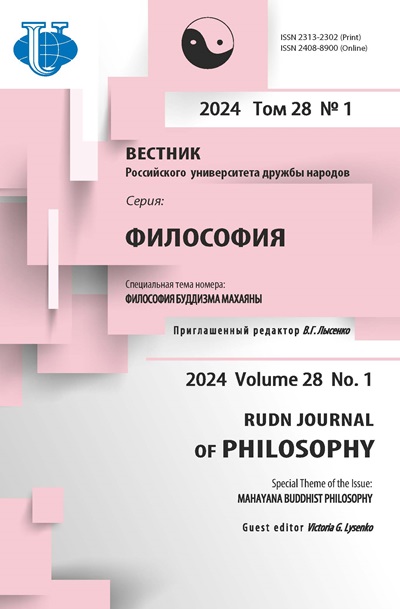Are the Ideals of Rationality Rational? On the Experimenter’s Regress, the Theoretician’s Regress, and the Epistemologist’s Progress
- 作者: Stoliarova O.E.1
-
隶属关系:
- Institute of Philosophy of Russian Academy of Sciences
- 期: 卷 28, 编号 1 (2024): MAHAYANA BUDDHIST PHILOSOPHY
- 页面: 136-147
- 栏目: Philosophy and sciences
- URL: https://journal-vniispk.ru/2313-2302/article/view/325452
- DOI: https://doi.org/10.22363/2313-2302-2024-28-1-136-147
- EDN: https://elibrary.ru/ADGFFB
- ID: 325452
如何引用文章
全文:
详细
The research is devoted to the problem of philosophically justifying rationality, which inevitably takes the form of a circular argument: to define what rationality is, we must refrain from referring to its criteria, which must be rationally defined beforehand. This epistemic circle is compared to the so-called “experimenter’s regress”. The experimenter’s regress involves reasoning in which judging the correctness of obtained scientific results can only be based on the correctness of the procedure of obtaining them and judging the correctness of the procedure of obtaining them can only be done by relying on the obtained results. From the perspective of social researchers of science, the experimenter’s (and the theoretician’s) regress casts a shadow on traditional theories of rationality that take science as a model of rational knowledge. The research analyzes the experimenter’s regress in the context of virtuous and vicious circles. It is shown that the experimenter’s regress is overcome by turning to external factors. These factors are proposed to be interpreted in terms of extended rationality. By analyzing the experimenter’s regress, social epistemologists consciously or unconsciously rationalize these “external” factors and enrich the concept of rationality. This allows qualifying the circle described by rationality in defining itself as virtuous and the work of the epistemologist as a progressive activity, during which both epistemology and its subject undergo qualitative changes.
作者简介
Olga Stoliarova
Institute of Philosophy of Russian Academy of Sciences
编辑信件的主要联系方式.
Email: olgastoliarova@mail.ru
ORCID iD: 0000-0002-0033-5906
DSc in Philosophy, Leading Researcher
bd. 1, 12 Goncharnaya St., 109240, Moscow, Russian Federation参考
- Shvyrev VS. Rationality as a Cultural Value. Tradition and Modernity. Moscow: Progress-Traditsija publ.; 2003. (In Russian).
- Zalta EN, editor. The Stanford Encyclopedia of Philosophy. Available from: https://plato.stanford.edu/ (accessed: 10.08.2023)
- Porus VN. Rationality. In: New Philosophical Encyclopedia. In 4 vols. Vol. 3. Moscow: Mysl' publ.; 2001. P. 425-427. (In Russian).
- Porus VN. Rationality. Science. Culture. Moscow: URAO publ.; 2002. (In Russian).
- Audi R. The Architecture of Reason: The Structure and Substance of Rationality. Oxford University Press; 2001.
- Collins HM. Changing Order. Replication and Induction in Scientific Practice. London, Beverley Hills, and New Dehli: Sage; 1985.
- Godin B, Gingras Y. The Experimenters’ Regress: From Skepticism to Argumentation. Studies in History and Philosophy of Science. 2002;33(1):133-148.
- Koyré A. An Experiment in Measurement. Proceedings of the American Philosophical Society. 1953;97(2):222-237.
- Guttinger S. The Limits of Replicability. European Journal for Philosophy of Science. 2020;10(2):10. Available from: https://link.springer.com/article/10.1007/s13194-019-0269-1 (accessed: 27.08.2023).
- Cling AD. The Epistemic Regress Problem. Philosophical Studies. 2008;140:401-421.
- Gooding D. Experiment and the Making of Meaning. Dordrecht: Kluwer; 1990.
- Kennefick D. Star Crushing: Theoretical Practice and the Theoreticians’ Regress. Social Studies of Science. 2000;30(1):5-40.
- Chalmers DJ. Why Isn’t There More Progress in Philosophy? Philosophy. 2015;90(1):3-31.
- Kasavin IT, Sokuler ZA. Rationality in Knowledge and Practice. Critical Essay. Moscow: Nauka publ.; 1989. (In Russian).
- Pruzhinin BI. Rationality and Historical Unity of Scientific Knowledge (Gnoseological Aspect). Moscow: Nauka publ.; 1986. (In Russian).
- Antonovski AYu. Incommensurability and Communication: To the Communicative Turn in Philosophy of Science. Epistemology and Philosophy of Science. 2022;59(4):92-110. (In Russian). https://doi.org/10.5840/eps202259460
- Sellars W. Empiricism and Philosophy of Mind. Harvard University Press; 1997.
- deVrie WA, Triplett T. Reading Wilfrid Sellars’s ‘Empiricism and the Philosophy of Mind’ (Including the Complete Text of Sellars’ Essay). Indianapolis/Cambridge: Hackett Publishing Company, Inc; 2000.
- Collins HM. A Strong Confirmation of the Experimenters Regress. Studies in History and Philosophy of Science. 1994;25(3):493-503.
- Franklin A. How to Avoid the Experimenter’s Regress. Studies in History and Philosophy of Scienc. 1994;25:463-491.
- Polanyi M. Personal Knowledge: Towards a Post-Critical Philosophy. University of Chicago Press; 1974.
- Dreyfus HL. What Computers Can’t Do: A Critique of Artificial Reason. Harper & Row; 1972.
- Collins HM. Tacit and Explicit Knowledge. Chicago: The University of Chicago Press; 2010.
- Forster MN. After Herder: Philosophy of Language in the German Tradition. Oxford University Press; 2010.
补充文件








